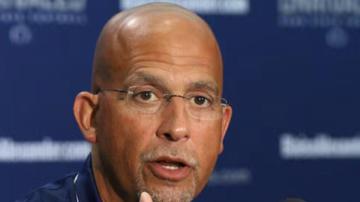How James Franklin Changed the Culture at Penn State
When James Franklin arrived at Penn State in January 2014, the Nittany Lions football program was a shadow of its former self

When James Franklin arrived at Penn State in January 2014, the Nittany Lions football program was a shadow of its former self. Reeling from the Jerry Sandusky scandal, severe NCAA sanctions, and a fractured community, the program needed more than a coach—it required a visionary to rebuild its soul. Franklin, fresh from transforming Vanderbilt into a competitive SEC force, stepped into this maelstrom with a blueprint not just for wins, but for a profound cultural shift. Over the past decade, he has redefined what it means to be a Nittany Lion, turning a program marred by controversy into a beacon of family, resilience, and excellence. As we approach the 2025 season, Franklin’s impact is undeniable: he has fostered a transformational culture that prioritizes people over transactions, loyalty over fleeting success, and holistic growth amid the chaos of modern college football.
Franklin’s approach stems deeply from his own turbulent upbringing, which forged his unyielding commitment to family as the cornerstone of his leadership. Born into a home plagued by domestic abuse, alcoholism, and financial instability, Franklin learned early the value of protection and unity. He stood up to his abusive father at age 17 to safeguard his mother and sister, an act that shaped his identity as a guardian. Losing both parents young—his father in 1997 and mother in 2007—left him yearning for the family stability he now instills in his teams. At Penn State, this translated into deliberate changes: integrating coaches’ families into practices, ensuring work-life balance, and creating an environment where players feel like kin rather than commodities. Unlike the transactional NIL-driven transfers dominating today’s landscape, Franklin emphasizes “transformational” experiences, where being a Nittany Lion reshapes lives beyond the field.
This family-first ethos quickly permeated the program, evident in unprecedented staff loyalty. In an era of coaching carousels, Franklin’s assistants stick around. Chuck Losey, the assistant athletics director for performance enhancement, has been with him since 2011 at Vanderbilt, praising the consistent, demanding yet supportive atmosphere. Andrew Nelson, a former player turned staffer, returned in 2024, drawn back by Franklin’s “insatiable desire” to elevate Penn State. Players echo this sentiment; the program has started just four different quarterbacks in Franklin’s tenure, a rarity in college football’s volatile quarterback market. This stability isn’t accidental—it’s the fruit of a culture built on core values: positive attitude, relentless work ethic, fierce competition, and selfless sacrifice. Franklin’s “1-0” philosophy encapsulates this, urging the team to treat every game with equal focus, fostering mental resilience that extends to academics and community service.
On the field, these cultural pillars have yielded tangible triumphs, pulling Penn State from the brink of irrelevance to perennial contention. Inheriting a sanctioned squad with depth issues, Franklin orchestrated a stunning turnaround. By 2016, the Nittany Lions claimed the Big Ten Championship, a feat that symbolized redemption. Under his watch, Penn State has finished in the top 12 of the College Football Playoff rankings in seven of the last nine seasons, appeared in two Rose Bowls, three other New Year’s Six bowls, and notched a playoff berth in 2024. His overall record at Penn State stands at over 100 wins, including a career mark of 125–57, with bowl victories in eight of 15 appearances. Stars like Saquon Barkley, who racked up 358 all-purpose yards in a pivotal 2018 win over Iowa, embody the explosive talent Franklin recruits and develops, sending dozens to the NFL.
Yet, Franklin’s cultural revolution extends beyond touchdowns. He has navigated Penn State through “cultural crossroads,” blending sacred traditions like the “We Are… Penn State” chant and the White Out games with modern realities. The transfer portal and NIL deals posed threats to the program’s “team first” ethos—plain uniforms, no names on jerseys—but Franklin adapted selectively. He welcomed transfers like offensive lineman Nolan Rucci while tasking leaders to preserve unity. The 2025 Beaver Stadium renovation, including a controversial naming rights deal with West Shore Home, tested this balance, pitting tradition against progress. Franklin’s response? Reinforce the culture through every facet: from alumni engagement to fan rituals, ensuring Nittany Nation remains a global family.
Critics argue Franklin hasn’t conquered the elites—his record against top-ranked teams hovers around .500—but this overlooks the broader transformation. In a sport increasingly commodified, he has restored “Success with Honor,” Joe Paterno’s old mantra, while forging his own path. The 2025 season, with an expanded playoff and high expectations, could define his legacy. As one Big Ten coach noted: “This is the season James Franklin’s entire coaching career could be judged.” But win or lose, Franklin has already won the cultural war. He inherited ashes and built a hearth—a place where players grow into men, staff thrive as family, and a community heals.
In State College, the roar of 107,000 fans isn’t just for victories; it’s for the revival Franklin engineered. His story reminds us that true leadership isn’t about flawless records, but about mending what’s broken and inspiring what’s possible.
Penn State is better—not just on the scoreboard, but in spirit—because of James Franklin.



